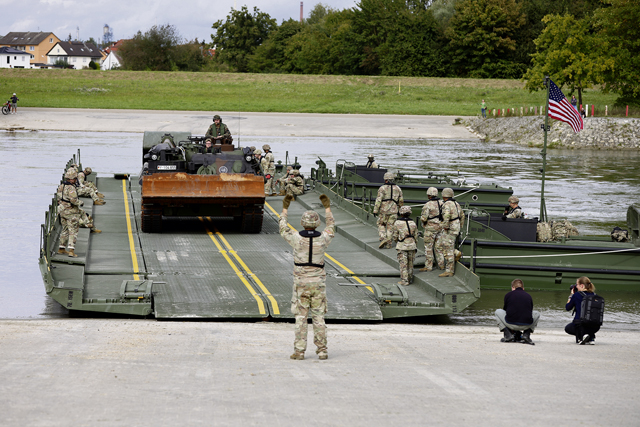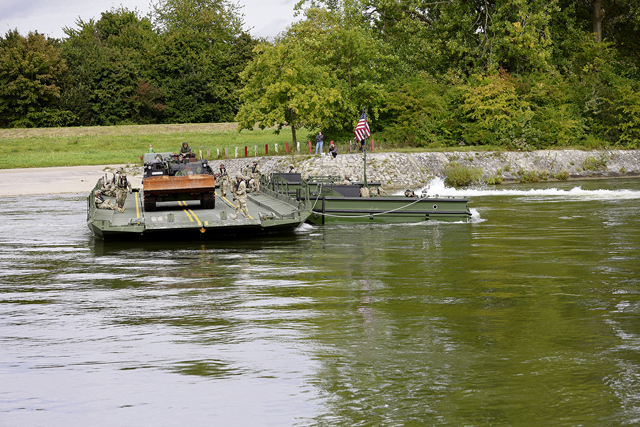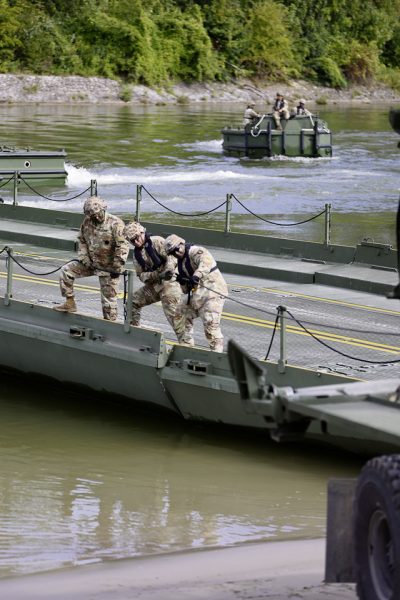
The 809th MRBC is the U.S. Army’s only permanently assigned Multi-Role Bridge Company within U.S. Army Europe and Africa.
The newly activated 809th Multi-Role Bridge Company conducted their first bilateral river crossing on the Danube River near Ingolstadt with the Bundeswehr (German Army) on Sep. 25.
More than 100 U.S. Army Soldiers gathered on the riverbanks of the Danube, which historically acted as the natural boundary for the Roman and Ottoman Empires more than 1,000 years ago.
The mission for the day was to successfully employ a 7-bay pontoon floating bridge, known as an Improved Ribbon Bridge powered by M30 Bridge Erection Boats, to guide Bundeswehr Engineer Corps Pioneer Panzer “Badger” vehicles across the obstacle.
“This is the first time that we have had the opportunity to work with our German allies by crossing their vehicles with our equipment,” said Capt. Michael MacGovern, the 809th MRBC company commander.

The 809th MRBC is the U.S. Army’s only permanently assigned Multi-Role Bridge Company within U.S. Army Europe and Africa.
The pontoon bridge used is designed to ferry any piece of rolling stock in the U.S. Army inventory to include heavy-wheeled or tracked combat vehicles.
According to Staff Sgt. Juan Kitt, the 809th MRBC 1st Platoon section sergeant, practicing the river crossings creates enhanced task proficiency that builds speed, efficiency, and safety. The Soldiers were motivated to place pressure on their processes during the event.
“The standard for this type of operation is 22 minutes. We are shooting for 11-15 minutes. This includes the time to safely build or employ our equipment and safely offload the vehicle on the opposite riverbank,” said Kitt.
The operation was conducted at the Bundeswehr-Dienstleistungszentrum Ingolstadt Pioneer School. The Pioneer School is the central training facility for the German Army’s engineering Soldiers and the special engineers of the Joint Support Service. The site is colloquially known as the “Motherhouse” of the Pioneers and is considered one of the most modern locations of the German Armed Forces.

“The Goal is to use training events like these to build upon the relationship between the 809th MRBC and the German Army. We have scheduled and are planning future training events in November with the ultimate goal to begin tying in the capabilities of 809th to the larger U.S. Army and NATO exercises in the region,” said MacGovern.
The 809th MRBC is the U.S. Army’s only permanently assigned Multi-Role Bridge Company within U.S. Army Europe and Africa.
According to MacGovern, the company is another arrow in the quiver of sustainment, transportation, and logistical support options that fall within the 21st Theater Sustainment Command’s mission set throughout Europe.
“Multi-role bridge companies provide a very unique engineering capability that bridges wet and dry gap crossings. We provide year-round bridging capabilities to enhance over-water movement and maneuver across theater,” said MacGovern. “There are hundreds of rivers in Europe, and we are the only permanent U.S. Army asset in theater that can provide a quick-and-place bridge that will enable maneuver forces to cross,” MacGovern explained
According to Lt. Col. Michael Wiehagen, the 15th Engineer Battalion commander, due to the 809th’s activation in July, the timeline for the U.S. Army to conduct crossing operations has been significantly reduced. “We moved from a timeline of 30 plus days to conduct a wet gap crossing by bringing in an MRBC from the Continental U.S. to mere days by having this capability in theater. Assured mobility furthermore enables the lethality and readiness of every brigade combat team and cavalry regiment in the theater,” Wiehagen added.
The company traces its lineage back to World War II when it was originally formed on March 29th, 1944, as the 525th Engineer Light Pontoon Company in Camp Maxey, Texas. It went on to serve in Central Europe and was redesignated as the 525th Engineer Panel Bridge Transport Company. Following World War II, it was deactivated. During the Cold War, the unit was reactivated as the 809th Engineer Company and stationed at Karlsruhe, Germany, and stayed active for more than 20 years in Germany until 1976.


